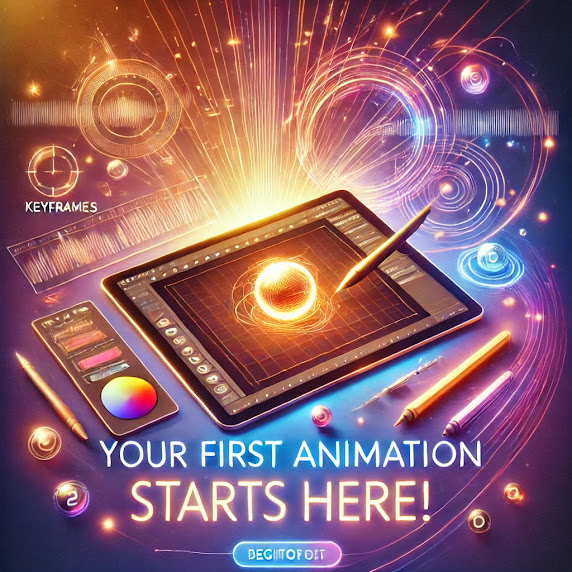🎨 The Ultimate Beginner’s Guide to 2D Animation: From Zero to Your First Animation 🎨
🌟Overcoming Fear and Embracing the Fun of 2D Animation
Starting your animation journey can feel intimidating. You might worry about your drawing skills, animation software, or whether you have the right tools. But here’s the truth: anyone can learn animation with patience and practice! 💪🏻
If you love animated movies, YouTube shorts, or classic cartoons, you already have the passion to get started! This beginner-friendly guide will take you from knowing nothing about animation to creating your very first animated scene. 🎉
💡 Understanding Animation Basics
Before jumping into animation software, let’s cover some key principles that will make your animations look smooth and professional:
✅ Squash & Stretch - Adds flexibility and realism. ✅ Timing & Spacing - Controls movement speed and flow. ✅ Ease In & Ease Out - Smooth transitions for natural motion. ✅ Anticipation - Small movements before an action make animations feel dynamic. ✅ Follow-Through & Overlapping Action - Gives objects secondary motion for realism.
Master these animation principles, and you’re already ahead of the game! 🎨🚀
💻 Choosing the Right Animation Software
There are many 2D animation programs, but beginners should start with easy-to-learn software that still has powerful features. Here are some great options:
📱 Flipaclip (Mobile) - Fun & simple for beginners. 🖥 Blender (PC) - Free & powerful (includes Grease Pencil for 2D animation). 👨🎨 Krita (PC) - Free & excellent for frame-by-frame animation. 🎮 Toon Boom Harmony (PC) - Industry standard, great for professional animation.
Pick software based on your device, budget, and workflow. Flipaclip is great for mobile users, while Blender or Krita are better for PC animators. 📝
🛠️ Essential Tools & Equipment
Many beginners think they need expensive tools, but that’s not true! Here’s what you actually need:
✨ Must-Have:
✔ A drawing device (phone, tablet, or computer)
✔ Animation software (one of the options above)
✔ Creativity & patience! 🚀🎨
🔥 Nice to Have (but not required):
✔ A graphic tablet (e.g., Wacom, Huion) for smoother drawing
✔ A bigger monitor for more workspace
✔ A powerful PC for advanced animation work
Start with what you have! Great animations can be made on just a phone! 📲👌
A POST WILL BE MADE ON EQUIPMENT TO USE
🎮 Step-by-Step Process: Creating Your First Animation
Let’s create a simple bouncing ball animation to practice essential motion principles. 🌟
1️⃣ Planning the Animation
💡 Open your chosen animation software & create a new project.
💡 Set your frame rate (12-24 FPS for smooth motion).
💡 Sketch a rough guide for the ball's movement path.
2️⃣ Sketching & Adding Frames
💪 Draw the ball at its starting position.
💪 Move to the next frame & adjust the ball’s position slightly.
💪 Use squash & stretch for impact & bounce realism.
💪 Enable onion skinning to see previous frames as a reference.
3️⃣ Refining Movement & Final Touches
🎨 Adjust timing & spacing for natural motion.
🎨 Add shadows or a simple background.
🎨 Play your animation & refine awkward movements.
Hit play and watch your first animation come to life! 🎉🚀
🚫 Common Mistakes & How to Avoid Them
Even professionals make mistakes! Here are some common beginner errors and how to fix them:
❌ Stiff Movements → Use ease in & ease out for smooth transitions.
❌ Uneven Timing → Keep consistent spacing for natural motion.
❌ Skipping Key Principles → Remember squash & stretch, anticipation, and follow-through!
❌ Overcomplicating Too Soon → Start simple, focus on small exercises before big projects.
💪 Conclusion: Start Animating Today!
The best way to learn animation is to start animating! 🎨🌟
Don’t worry about perfection—every animator improves with practice. Try the bouncing ball exercise, explore your chosen 2D animation software, and most importantly, have fun! 🎉
Want more animation tips? Follow V-Star Animation for expert advice, and share your progress in the comments! 👏 What will you animate next? 🚀.



Comments
Post a Comment